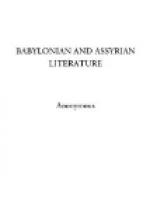1 The beginning[1]—The baneful charm[2]
like an evil demon
acts against[3] the man.
2 The voice that defiles acts upon him.
3 The maleficent voice acts upon him. 4 The baneful
charm is a spell that originates sickness.[4] 5
This man the baneful charm strangles like a lamb.
6 His god in his flesh makes the wound. 7 His
goddess mutual enmity brings down. 8 The voice that
defiles like a hyena covers him and subjugates
him.
9 Merodach[5] favors him; and 10 to his father
Hea into the house he enters and cries: 11 “O
my father, the baneful charm like an evil demon acts
against the man.”
12 To the injured (man) he (Hea) speaks thus:
13 “(A number) make: this man is unwitting:
by means of
the number he enslaves thee.”
14 (To) his son Merodach he replies[6] 15 “My
son, the number thou knowest not; the number let
me fix for thee.
16 Merodach, the number thou knowest not; the number
let
me fix for thee.
17 What I know thou knowest. 18 Go, my son Merodach.
19 ... with noble hand seize him, and 20 his enchantment
explain and his enchantment make known. 21 Evil (is
to) the substance of his body,[7] 22 whether (it
be) the curse of his father, 23 or the curse of his
mother, 24 or the curse of his elder brother, 25
or the bewitching curse of an unknown man.”
26 Spoken (is) the enchantment by the lips of Hea.
27 Like a signet may he[8] be brought near. 28 Like
garden-herbs may he be destroyed. 29 Like a weed
may he be gathered-for-sale. 30 (This) enchantment
may the spirit of heaven remember,
may the spirit of earth remember.
31 Like this signet he[9] shall be cut, and the sorcerer 32 the consuming fire-god shall consume. 33 By written-spells he shall not be delivered. 34 By curses and poisons he shall not be moved. 35 His property (and) ground he shall not take. 36 His corn shall not be high and the sun shall not remember (him).
[Footnote 1: The Accadian word is translated by the Assyrian “siptu” ("lip"), and may be translated “beginning” or “fresh paragraph.”]
[Footnote 2: In the Assyrian version, “curse.”]
[Footnote 3: In the Assyrian, “goes against.”]
[Footnote 4: In the Assyrian, “(is) the cause of sickness.”]
[Footnote 5: The Accadian god identified with Merodach by the Assyrian translator was “Silik-mulu-khi” ("the protector of the city who benefits mankind"). He was regarded as the son of Hea.]
[Footnote 6: The verbs throughout are in the aorist, but the sense of the original is better expressed in English by the present than the past tense.]
[Footnote 7: That is, the sorcerer’s.]
[Footnote 8: The sorcerer.]
[Footnote 9: The sorcerer.]




